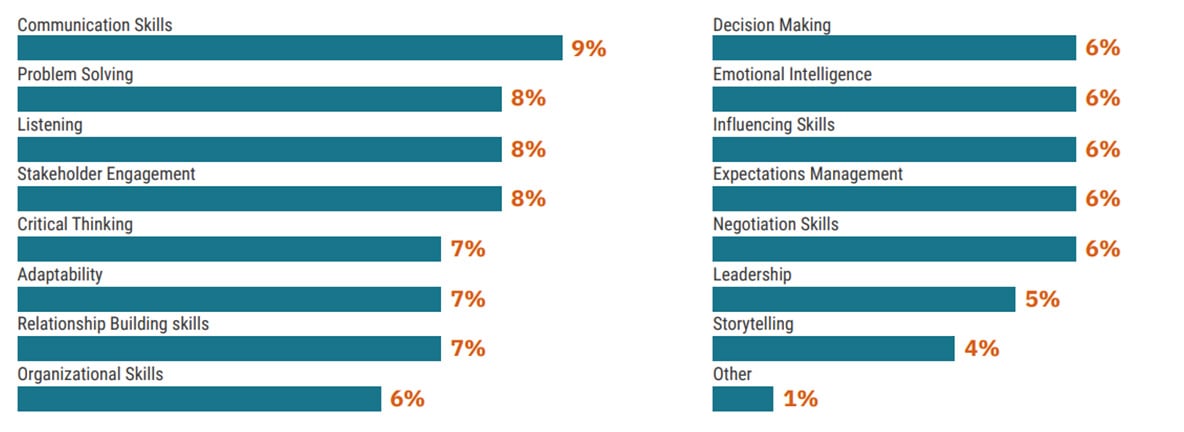6 Skills for Your Everyday Business Analysis Practices
Receive free IIBA updates and exclusive content!
Soft skills are skills applicable to all business professions but especially critical to those in business analysis. Why? That’s because “business analysis is the practice of enabling change in an enterprise by defining needs and recommending solutions that deliver value to stakeholders.” BABOK® Guide. In order to enable change, a combination of foundational business analysis knowledge, experience, techniques, and both hard and soft skills are needed in a business analysis professional's daily work and practices.

What Are Soft Skills?
Alison Doyle at thebalancecareers.com explains soft skills as, “Soft skills relate to how you work. Soft skills include interpersonal (people) skills, communication skills, listening skills, time management, and empathy, among others. They are among the top skills employers seek in the candidates they hire, because soft skills are important for just about every job.” A recent SHRM (Society for Human Resource Management) report states, hiring managers typically look for job candidates with soft skills because they make someone more successful in the workplace.
What about hard skills? Well, according to LinkedIn’s Top 10 Most In-Demand Hard Skills, business analysis ranked at the number 6 spot, up 10 from its previous position. “Business analysis made the most significant jump of any skill on our list and it's one of the few hard skills every professional should have, as most roles require some level of business analysis to make decisions”. So, staying on top of the trending skills and overall skill development is important in your career development.
6 Business Analysis Soft Skills
Are you looking at refreshing your soft skills? Wondering what the top soft skills for are for business analysis professionals? According to Indeed.com, these are the six soft business analysis skills they recommend for workplace success.
- Communication
- Critical thinking
- Problem-solving
- Negotiation
- Attention to detail
- Teamwork
Soft Skills Ranked for Analyst Roles
Soft skills are transferable skills important to the success in any role. Employers value soft skills because they enable business analysis professionals to cooperate, collaborate, and thrive within an organization. In IIBA’s 2021 Global State of Business Analysis Survey, business analysis professionals ranked the soft skills they use regularly in their role below.

Online Resources to Sharpen Your Skills
Access to online tools that provide examples of how to apply techniques or skills are available to help keep your skills toolbox fresh. For example, IIBA’s KnowledgeHub lets users easily access templates, checklists, videos, and “how-to” scenarios to apply in their daily work.
“How do I” scenarios provide actionable, situational content, in an easy-to-follow format, contributed by leading business analysis professionals from the community. In the latest content release, the scenarios help users enhance their elicitation, collaboration, and communication skills. The complete list of scenario topics includes:
- How do I choose the right elicitation technique for the right audience?
- How do I make elicitation discussions more collaborative than combative?
- How do I talk and communicate to executives?
- How do I manage logistics for elicitation activities?
- How do I know when to verify vs. validate requirements?
- How do I understand business rules and business processes?
- How do I describe user system interactions?
- How do I understand today's business processes?
- How do I confirm the information that has been captured?
- How do I capture key requirements?
- How do I identify what needs to be done?
- How do I manage different types of requirements?
- How do I determine who should be involved?
Take a Peek of a Scenario in Action
Did you know IIBA Members receive unlimited access to the KnowledgeHub as part of their Member benefits? If you’re not a member join IIBA today to gain access to all the latest updates and more.
To find out more about the information available in IIBA’s KnowledgeHub, visit IIBA.org/AccessToAnalysis.
About The Author:

Tiffani Iacolino is a Product Marketing Manager at IIBA® and has 15+ years of marketing experience across the legal, technology, telecommunications, publishing, media, and professional services industries. She’s passionate about delivering meaningful products and solutions to the business analysis community, including IIBA’s latest offering the Cybersecurity Analysis Learning and Certification Program. Hailing from the Greater Toronto Area, she enjoys an amazing cup of coffee, running, and yoga -- between chasing her two adorable children!



